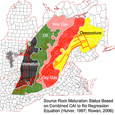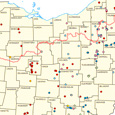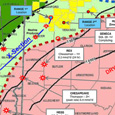Pros and Cons: Selling your Mineral Rights
Wednesday, June 20, 2012

WOODSFIELD, Ohio — Take a ride in eastern Ohio and it is evident the landscape is changing. In some areas, driveways for gas well sites are being constructed, well pads are being poured and drilling is commencing, all for the much-touted energy boom.
Shale boom
All of these changes bring economic benefits, right?
Not all of the time. Just ask Ken Buell.
The benefits are being reaped only by those who own their mineral rights, and he is not one of them.
But he owns the land on which the largest reported producing Utica shale well is located.
Super-producer
Just to give you an idea how large, according to numbers reported to the Ohio Department of Natural Resources, at peak production, the Buell well was producing 9.5 million cubic feet per day and 1,425 barrels of natural gas liquids and oil. That is more than 3,000 barrels of oil per day.
In comparison, the average Ohio well produces only 50,000 cubic feet of gas and less than a barrel of oil a day.
Buell, 73, farms near Columbus in Delaware County now. However, he bought the 243 acres of Harrison County property in the late 1970s for deer hunting.
He owns the surface rights, but not the mineral rights.
No mineral rights
He knew when he purchased the land that the mineral rights belonged to the North American Coal Corporation in Texas.
Buell said he was fine with not owning the mineral rights and he is still fine with it.
“I have no problems with them owning the mineral rights. I have no problem with them harvesting them. It’s how they go about things is what bothers me,” said Buell.
Imagine, coming home one day and you can’t get into your own home. That’s what happened to him when he went to his property and could not enter it because of a locked gate.
“Can you imagine not being able to use your own property and never having gotten a courtesy phone call that they were going to do this?” Buell said.
Litigation
Buell couldn’t talk much about the situation in detail because he is involved in litigation with Chesapeake Exploration, but he did have some advice for anyone considering purchasing land that does not have mineral rights.
“Ask questions. Ask questions. Do research. Ask questions. Ask more questions. Do research and then repeat the process over and over again until you know exactly what is going on. Don’t get in a hurry,” said Buell.
He said above all else, he would just like to be treated like he treats others: with respect.
“It’s that kind of stuff, like the attitudes that made this what it is,” said Buell.
Other side of coin
But what if you own the mineral rights and decide you don’t want to wait to receive royalties from your lease. What if you want your money now?
The real money in the shale boom, said Atty. Richard A. Yoss, of Monroe County, is in the possible royalties, and not the upfront lease money, or even from the sale of the mineral rights themselves.
Yoss, who has been dealing with mineral rights for more than 30 years, said the key to gaining the most economic benefit from the shale boom is to work with the leasing company toward production.
“I’d rather have a 12 1/2 percent royalty coming in than a piece of paper that says I’ll get 21 percent royalties,” said Yoss.
Mineral rights sales
And when it comes selling mineral rights, Yoss had one piece of advice: Don’t even consider it!
Yoss said his experience shows that it may seem like a good idea, but the wait for the royalties will be worth it. He said that even if a family signed for a low lease bonus, the royalties in the end will be worth the wait, so don’t sell those mineral rights.
He said he can’t imagine the problems that will be left behind if landowners start selling their mineral rights in large amounts.
Down side
For example, he said, you could purchase a farm without mineral rights, and if someone else owns the mineral rights and leases them, then a gas company could enter the land to drill, leaving you with only the money for surface damages, and possibly nowhere to farm.
The person owning the mineral rights would collect the royalties, while you, the surface rights owner, still bear the responsibility of paying the mortgage payments on ground with limited use.
Yoss said it has been a difficult process just attempting to find out who has the rights to minerals through past leases. He can’t even imagine the confusion that will be left to future generations by the sales of mineral rights.
“Some landowners think they know when they buy their property, who has a lease on it. However, they may not know all of the parties because some date back to the 1890s,” said Yoss.
Coal rights v. gas rights?
Another situation Yoss has dealt with is a property where one party leases the gas and oil rights and someone else owns the coal rights. In some instances, the coal company forces the gas well to be plugged after it is drilled in order for them to obtain the coal.
So far, his law firm has been 95 percent successful in abandoning the old leases using the Dormant Minerals Rights Act.
Do you want to renegotiate an old lease? Click here for details.
What’s the benefit of selling your mineral rights? Click here.





It’s surprising when you mentioned that someone who had sold his mineral rights to an oil company could not even enter their property since the company had it locked down. My father is thinking of selling his mineral rights but is worried that he won’t be able to use the surface for his own once the company decides to harvest or mine for minerals. He thinks the royalties may not be enough to compensate for non-usage of surface land. Reading about the pros and cons that you have listed will help my dad decide on the best way to sell his mineral rights.